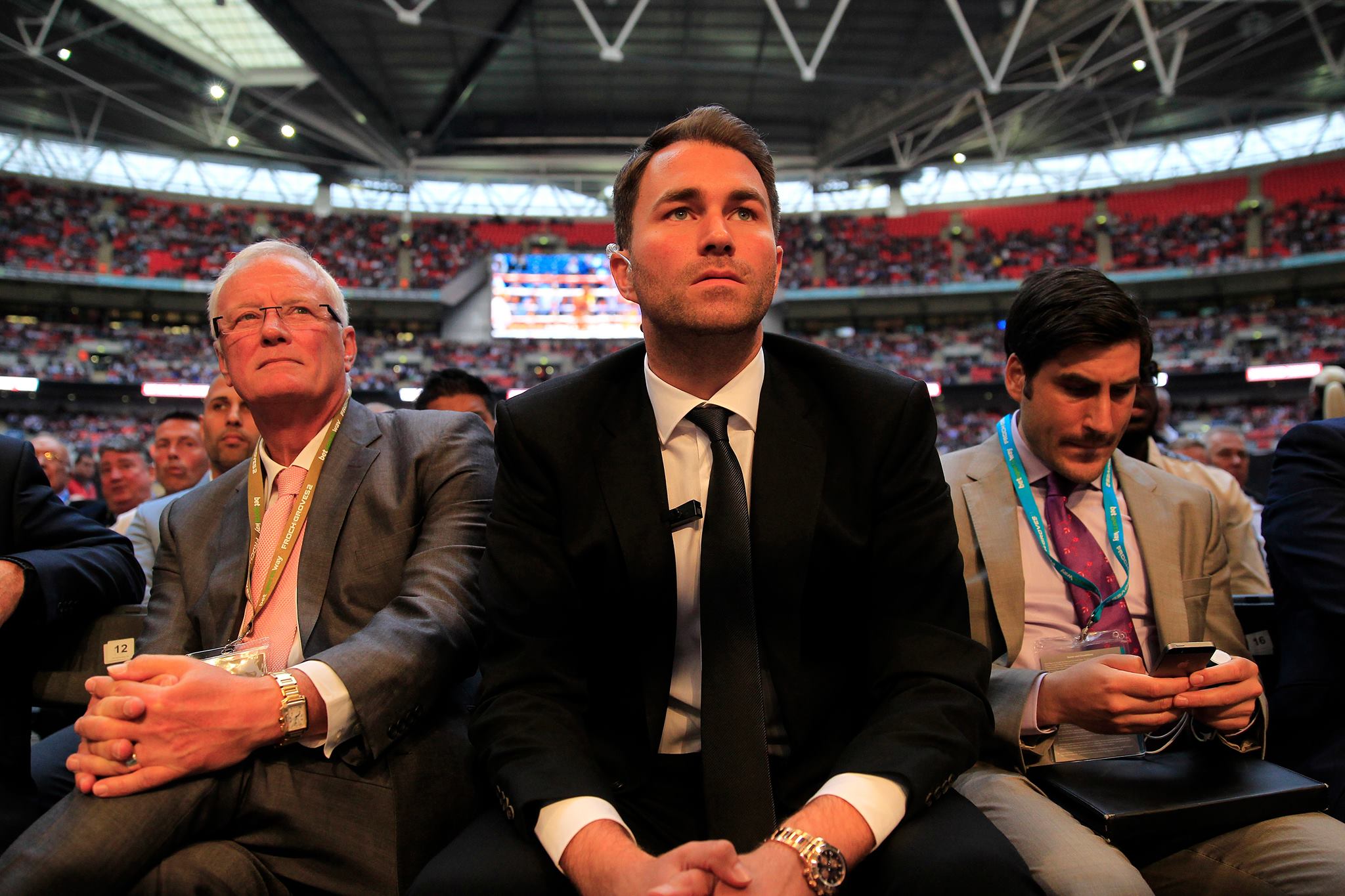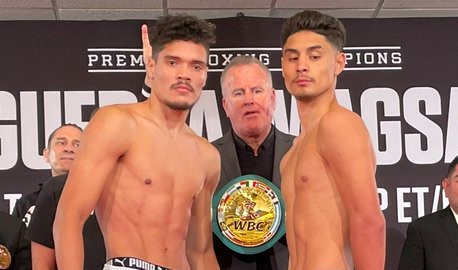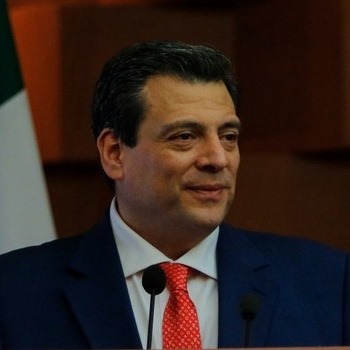By: Jesse Donathan
Perhaps the biggest scandal of 2019 in professional boxing is currently unfolding as heavyweight Dillian Whyte tested positive for metabolites of the prohibited performance enhancing drug Dianabol prior to his most recent decision victory over Oscar Rivas. The United Kingdom’s own government oversight bodies, United Kingdom Anti-Doping (UKAD) and the British Board of Boxing Control (BBBofC), failed to take action or even notify the Rivas’ camp of their findings prior to the fight in an unconscionable decision that may haunt the oversight bodies for long to come in the future.
According to an August 1, 2019 frankwarren.com article titled, “Where’s the B Sample?” author Frank Warren writes, “The silence surrounding the failed drug test of Dillian Whyte – and the subsequent permission given for him to fight – continues to hold firm.” Warren, a fight manager and promoter to some of the biggest names in the industry including Tyson Fury would go on to write:
“Whatever has taken place in this case and whether there has been “procedural issues”, lawyers have written to most of the media claiming Whyte’s privacy is being invaded, despite the fact he has gone on record himself on a number of occasions accusing some fighters, including Anthony Joshua, of being “Juicers” without providing any proof.”

The Warren report goes on to state, “After making such accusations, I believe he forfeits any right to privacy after he was informed that he himself had tested positive.” The overall tone and focus of Warren’s article being that of one in defense of the circumstances that lead to the news of Whyte’s flagged test result becoming public knowledge in an interesting picture to consider.
Whyte, an intelligent man who is not afraid to speak his mind, had previously summed up former heavyweight champion Anthony Joshua’s troubles in the ring against Andy Ruiz Jr. as being the result of fighting in the United States under the stringent Voluntary Anti-Doping Association (VADA) testing program where obtaining therapeutic use exemptions (TUEs) is markedly more difficult to achieve than in the United Kingdom.
Warren, not lost for words on the subject, went on to write, “Thomas Hauser, one of the most respected journalists in the sport has rightly reported on this matter is now being discredited by Eddie Hearn. Yet he fails to elaborate on which points are supposedly wrong.”
According to Warren, “As a leading boxing writer and lawyer, is it right that Hauser has to endure having his reputation trashed for doing his job and bringing this serious matter to the public’s attention and more importantly, to the man most affected by this sorry situation, Rivas?” Indeed, if not for Thomas Hauser, his sources and subsequent reporting, one has to wonder at what point if ever any of this information would have ever come to light.
In the original July 24, 2019 boxingscene.com article titled, “Dillian Whyte Tests Positive for Banned Substance,” author Thomas Hauser writes, “Under VADA protocols, the positive test result would been reported to the World Boxing Council and Rivas camp. That appears to have not been the case in this instance with UKAD.”
You read that right, UKAD not only allowed the fight to proceed after a positive test from Whyte but failed to notify his opponent who was literally stepping into the ring with his life on the line against a potentially doped fighter.
Referencing an August 1, 2019 boxingscene.com article titled, “Whyte Completes VADA Testing Program – But Not Yet in Clear,” author Jake Donovan writes that both Rivas and Whyte had pre-fight VADA samples collected on July 17 and post-fight samples on July 21, approximately a day after the bout. According to Donovan, VADA had announced the fighters had entered the testing pool on April 26, 2019 and that United Kingdom Anti-Doping (UKAD), a separate government body from the prestigious Voluntary Anti-Doping Association (VADA) conducted their own distinct drug test from that of the VADA testing program.
Donovan goes on to write, “The remaining question is how his late-June test with UKAD produced the lone adverse finding through 12 weeks of testing with two different agencies. Any such cleared test from either agency would also have to fall within the timeframe the substances in question remain in the human system, which would support Whyte’s case.”
Whyte reportedly tested positive for metabolites of the anabolic steroid Dianabol, a banned performance enhancing drug with a half-life of 3 to 5 hours according to a January 17, 2017 anabolic-bible.org article titled, “Dianabol -Methandrostenone.” According to author Jay Nichols, “The half-life of Dianabol is only about 3 to 5 hours, a relatively short time. This means a single daily dosage schedule will produce a varying blood level, with ups and downs throughout the day. The user likewise has a choice, to either split up the tablets during the day or to take them all at one time.”
Nichols goes on to write, “The usual recommendation has been to divide them and try to regulate the concentration in your blood. This however, will produce a lower peak blood level than if the tablets were taken all at once, so there may be a trade off with this option.” One such technique in particular, known a micro-dosing, is a methodology of taking small, barely detectable amounts of performance enhancing drugs in order to reap their rewards while minimizing the potential punitive risks and consequences associated with more commonly used administrative schedules.
Google defines the term half-life as, “The time required for any specified property (e.g. the concentration of a substance in the body) to decrease by half.” So that means if Whyte was theoretically dividing his dosages of Dianabol up in micro-dosages to regulate the concentration in his blood it would take 3-5 hours for that concentration to decrease by half until the concentration halves itself into undetectable levels.
A February 12, 2018 BusinessInsider.com article titled, “Olympians may be taking cues from Silicon Valley’s favorite way to do drugs,” author Eric Brodwin writes, “Testosterone micro-doses may escape regulators’ radar because they only stay in the system for minutes or hours.” Dianabol is of course a modified form of testosterone.
This may be the answer to Donovan’s remaining question, simply put, it’s all a matter of the timing of the test in relation to the amount and last ingestion of the Dianabol itself. With such a short half-life, athletes may be able to pass random tests simply based upon the nature of the drug itself in relation to the timing of the testing. Unless caught within the timeframe it takes for the drug to half itself out of detectable levels through micro-dosing, its theoretically possible to avoid detection altogether under the currently standing conditions.
Both VADA and UKAD would use World Anti-Doping Agency (WADA) accredited testing facilities, which means the testing procedures for both individual, separate agencies would be dependent on laboratories that adhere to the same WADA Code of scientific testing procedures and protocols. The adverse finding was not from the prestigious Voluntary Anti-Doping Association (VADA) but from the sore thumb in the crowd United Kingdom Anti-Doping (UKAD), which may or may not bring into question the sample chain of custody with UKAD’s Doping Control Officers (DCOs), Blood Collection Officers (BCOs) and Chaperones.
In an August 12 2019 skysports.com article titled, “Dillian Whyte remains determined to clear his name over drug allegations, says Eddie Hearn,” Whyte passed the Voluntary Anti-Doping Association (VADA) tests both before and after his latest addition to the win column. According to the report, “The British heavyweight faced allegations of a failed UK Anti-Doping A sample following his points win over Oscar Rivas at The O2 in July, but has declared his innocence. The B sample results have not been disclosed.” Whyte, an unusually candid man who is not prone to tell tall tales often may be telling the truth in professing his innocence and there is more going on here than initially meets the eye, but only his team of lawyers and time will ultimately see to how the tale is ultimately told.
According to a July 30, 2019 talksport.com article titled, “Frank Warren slams ‘totally wrong’ handling of Dillian Whyte positive drugs test and says Oscar Rivas should have been told,” author Michael Benson writes that Dillian Whyte had appeared before an “independent panel hearing on fight day and was allowed to compete.”
One has to question the efficacy of such a panel hearing on of all days, fight night, after television and pay-per-view rights had already been negotiated, venues booked, tickets purchased etc. For a main event fight to be cancelled at the very last second would literally mean tens, if not hundreds of millions of dollars, in lost revenue and likely lawsuits for some time to come into the future. In other words, it would have been a disastrous turn of events and thus one not likely to have occurred as a result.
According to Talksport.com, “There was a hearing, if you have a problem with that hearing, speak to the national UKAD government agency or whatever, Hearn said.”
With Dillian Whyte in the spotlight, all eyes are on UKAD and the BBBofC as UKAD, the less prestigious of the two agencies actively monitoring Dillian Whyte’s performance enhancing drug use produced the lone positive result yet sanctioned the fight anyway. With UKAD for all intents and purposes being the long arm of the BBBofC, the government agencies are two pigs in a blanket in this growing controversy.
Subsequently, news of Whyte’s flagged test result managed to leak out to the press through multiple unknown sources with direct knowledge to the situation according to Hauser’s original report with a short list of potential suspects who could have been privileged to that information. The B sample results, which would either confirm or bring into question the results of the original A sample are being withheld, leaving many to question the motives behind the lack of transparency, perhaps even striking at the very integrity of the governing bodies themselves.
Whyte was allowed to compete despite a flagged test result for performance enhancing drugs by government bodies whose responsibility it is to protect the health and safety of its athletes. With boxers Maxim Dadashev and Hugo Santillan recently dying within a week of each other as a result of injuries sustained in the ring, the fact UKAD and BBBofC allowed this fight to commence without informing the Rivas camp prior to the fight is an unconscionable decision that is now under intense scrutiny. And the subsequent refusal to release Whyte’s B sample is only adding fuel to the fire in what may very well prove to be 2019’s most scandalous report in professional boxing.
About the author: Jesse Donathan is the UFC correspondent for BoxingInsider.com and contributing editor to MMAPressRoom.com. A longtime fan of both boxing and mixed martial arts, Jesse’s first published combat sport reports were in 2009 and he was written for a number of outlets to include most recently BoxingInsider.com, Boxing.com and Fightpost.co.uk. Follow Jesse on Twitter @the_mmapress and @MMAPressRoom for up-to-date news and current events in combat sports.



















Galeria Obrazów Online
02/19/2024 at 3:22 am
Really enjoyed your post! The way you break down the information makes it so accessible and interesting. Thanks for the great read!
AlbertImipt
06/25/2024 at 3:48 am
pin-up kazino https://azerbaijancuisine.com/# pin-up casino giris
pin-up online casino
Stephenrhype
06/29/2024 at 4:23 am
buying prescription drugs in mexico online: mexico pharmacy – buying from online mexican pharmacy
DonaldBiono
06/29/2024 at 11:38 am
mexico drug stores pharmacies
https://cmqpharma.online/# mexico drug stores pharmacies
mexican mail order pharmacies
Michaelmoolo
07/19/2024 at 10:08 pm
mexico pharmacy: buying prescription drugs in mexico – mexican border pharmacies shipping to usa
EdwardLoobe
07/20/2024 at 4:01 am
https://canadapharmast.com/# legitimate canadian online pharmacies
Michaelmoolo
07/20/2024 at 6:45 am
world pharmacy india: india pharmacy – india pharmacy mail order
Davidtoows
07/20/2024 at 12:24 pm
mexican rx online: mexican pharmacy – purple pharmacy mexico price list
Michaelmoolo
07/20/2024 at 4:16 pm
canadian discount pharmacy: canadian pharmacies online – canadian pharmacy world reviews
EdwardLoobe
07/20/2024 at 5:07 pm
http://canadapharmast.com/# canadian medications
Davidtoows
07/20/2024 at 6:01 pm
best online pharmacy india: indian pharmacy – buy medicines online in india
CharlesRor
07/20/2024 at 8:26 pm
online pharmacy india [url=https://indiapharmast.com/#]top online pharmacy india[/url] indian pharmacies safe
Davidtoows
07/20/2024 at 11:07 pm
buying prescription drugs in mexico: mexico drug stores pharmacies – pharmacies in mexico that ship to usa
Michaelmoolo
07/21/2024 at 1:03 am
canadian discount pharmacy: canadian pharmacy sarasota – canada pharmacy 24h
Davidtoows
07/21/2024 at 4:17 am
п»їlegitimate online pharmacies india: reputable indian online pharmacy – best india pharmacy
EdwardLoobe
07/21/2024 at 5:59 am
http://canadapharmast.com/# trustworthy canadian pharmacy
Davidtoows
07/21/2024 at 9:08 am
canadian pharmacy india: reputable canadian online pharmacies – online canadian pharmacy reviews
Thomaskef
07/21/2024 at 6:25 pm
http://clomiddelivery.pro/# where to get clomid prices
Jamesjam
07/21/2024 at 8:10 pm
buy vibramycin: doxycycline 50 mg price – buy 40 mg doxycycline
Thomaskef
07/22/2024 at 2:40 am
https://paxloviddelivery.pro/# paxlovid covid
Jamesjam
07/22/2024 at 8:50 am
where can i get generic clomid no prescription: where to buy cheap clomid no prescription – how to get generic clomid tablets
Thomaskef
07/22/2024 at 10:33 am
https://amoxildelivery.pro/# order amoxicillin no prescription
Thomaskef
07/22/2024 at 6:24 pm
http://amoxildelivery.pro/# cost of amoxicillin 30 capsules
Jamesjam
07/22/2024 at 9:28 pm
doxycycline 100mg tablet brand name: doxycycline 100 mg order online – how much is doxycycline 100mg
Thomaskef
07/23/2024 at 2:18 am
http://paxloviddelivery.pro/# paxlovid pharmacy
Thomaskef
07/23/2024 at 9:33 am
https://clomiddelivery.pro/# can i purchase generic clomid online
Jamesjam
07/23/2024 at 10:10 am
amoxicillin online without prescription: amoxicillin generic brand – amoxicillin buy online canada
Thomaskef
07/23/2024 at 4:56 pm
https://ciprodelivery.pro/# ciprofloxacin over the counter
Jamesjam
07/23/2024 at 10:51 pm
where to get generic clomid pills: can i get generic clomid online – cost clomid price
Thomaskef
07/24/2024 at 1:16 am
http://amoxildelivery.pro/# amoxicillin 500 mg purchase without prescription
Jamesjam
07/24/2024 at 11:39 am
buy ciprofloxacin: buy cipro no rx – buy cipro no rx
Jamesjam
07/25/2024 at 12:10 am
amoxicillin 800 mg price: amoxicillin pills 500 mg – where can i buy amoxicillin without prec